| |
"A traffic accident on the road meant I reached the airport half an hour late. I repaired to the bar which overlooked the main runway, and while I gulped a restorative brandy I watched the plane I'd been due to board revving its engines and accelerating down the runway. It took off smoothly and climbed until it was quite small in the sky before suddenly exploding into a ball of fire." |
| |
Producer Michael Deeley trying to get home from South America
shooting Murphy's War from his illuminating memoir Blade
Runners, Deer Hunters and Blowing the Bloody Doors Off. |
Just before I dive into the jungles of Venezuela, I'd just like to share a personal recollection with eerie parallels to Deeley's tale. In the late 80s, I was working with an American husband and wife team on a documentary in London and while the husband flew back to California to prep for a Christmas in the sunshine, the wife stayed in London for a few more days while we worked a few more details out on the film. She booked her flight unaware we'd organised our wrap party scheduled the same evening. There was a rumour that foot massages were on the table. We convinced her to cancel her flight which she did somewhat reluctantly as it was close to the holiday season. We gathered for our party on the Wednesday, the 21st December 1988 and who watched TV or listens to radios in party-mode? At seven o'clock that very night her intended flight, Pan Am Flight 103, exploded over Lockerbie, Scotland killing all passengers and crew and claiming the lives of 11 Lockerbie residents who literally could not have known what hit them. This took the total fatalities up to 270. It remains the worst terrorist attack on British soil.
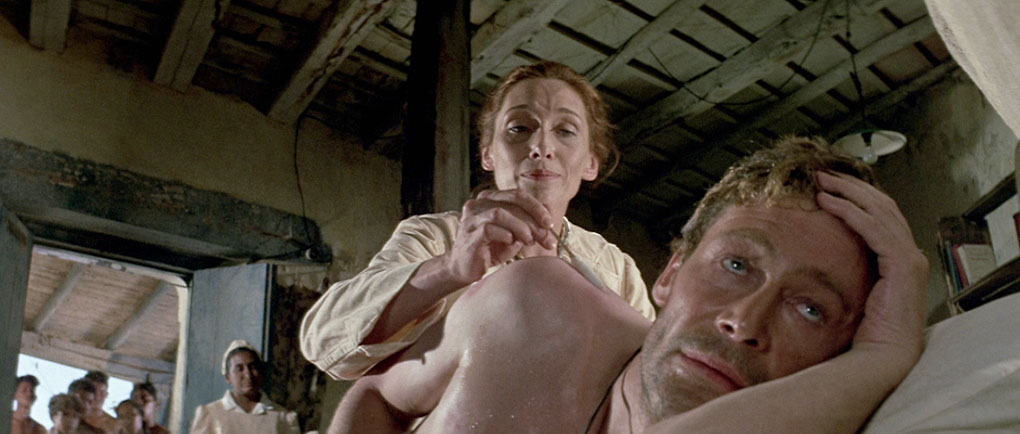
Not to trivialise this tragedy (and by God, was this a darkly momentous and tragic event) but Murphy's War relies on the presence of explosive material for its narrative beats. To summarise, it's the tail end of World War II and a German U-Boat has sunk an Allied merchant ship and not content to leaving the men overboard to swim to the river banks or get stripped to the bone by the piranhas, the German commander orders the helpless swimming sailors to be executed via machine gun. It's a harrowing opening sequence that underlines the appalling immorality of the world's most infamous bad guys, the Nazis. The first shot of the German U-Boat Commander made me double take. First I thought it was a young Clint Eastwood and then after sober reflection, I concluded that he looked like the offspring of Eastwood and Mads Mikkelsen if male procreation was of course possible. No idea how much trouble I'd get into here if I simply stated the fact that it isn't so I'll leave it unsaid. Ah. One man dodges the bullets and survives the oil ignited sea to haul himself up onto a wooden frame sticking out of the river. Delirious and in shock, this is Murphy, the seemingly sole survivor of the massacre.
After being tended to by a female doctor, Dr. Hayden, Murphy, (a person of his time as are we all) gives us very solid clues as to what was expected and relied upon in 1945. Female doctors were not on Murphy's list. She is dismissive of Murphy's claims that there was a U-Boot in the Orinoco river. After his midges are taken care of, he slowly recovers and forms a friendship with Louis, a French crane operator. This unlikely pair hatch a plot to find the U-Boat and bomb it from the air with homemade explosives. There are a few glitches in the plan, namely Murphy can't fly a seaplane… Murphy's actions bring the wrath of the Germans down on the settlement and a last desperate plan is conceived…
I have very fond memories of this film, seeing it in the cinemas at the time and quite a few times since. Having read the book quoted above twice now, it seems that the production was fraught with difficulty and you have to remember that before the digital stained glass knight in Young Sherlock Holmes and the full size CG dinosaurs of Jurassic Park, everything had to be shot for real in the real world. The most amazing aspect of Murphy's War, which I wouldn't have appreciated at the time but now am astounded by, is the reality of what I was watching. That's a real submarine in that river and that's a real sea plane and crane. Yes, there are a few process shots (Murphy in the cockpit shot against a front projected background) and very few miniature shots (water, a substance unable to be miniaturised, is always the giveaway) but on the whole the practical, physical reality of the machines in the film make me astounded that they managed to shoot anything in those conditions at all. And it really is Peter O'Toole standing under the sea plane guiding it with a rope as it's being slowly lowered to the ground. That looked really risky. And how did they shoot those astounding aerials? As Murphy coaxes the plane into the air (one assumes pilot Frank Tallman but O'Toole assures us he was actually flying that plane with the non-acting requisite look of terror in a handful of shots) the coverage of it flying indicates an extraordinarily manoeuvrable helicopter with a pilot and cameraperson of daring skill. No helicopter gimbal mounts in 1971 to my knowledge. The BBC introduced the world to this Steadicam of the skies in 2006 (once the military had invented it of course). This was a human camera operator in a helicopter and the smoothness of the shots is faultless. Hats off to Gilbert Chomat the helicopter pilot and aerial photographer Ron Taylor. Just extraordinary.
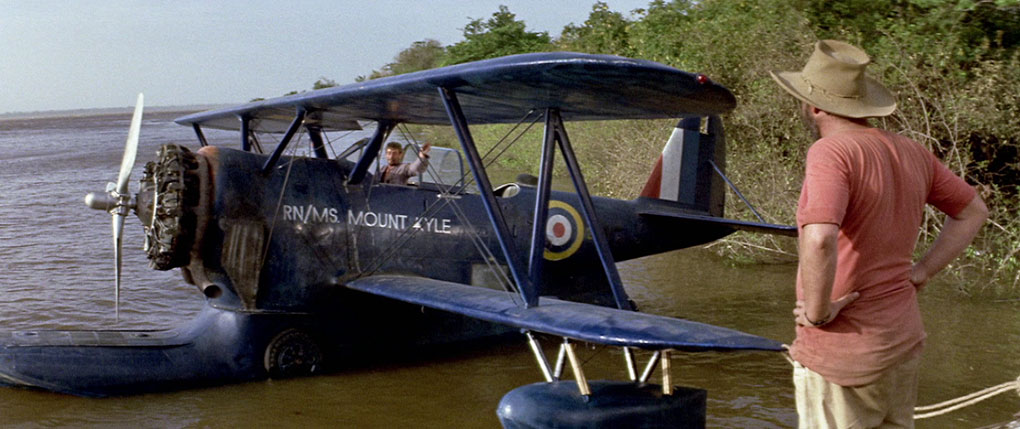
Murphy's War was made almost fifty years ago and perhaps there's one aspect of filmmaking that does date over the decades and there's not much to be done about it. I experience the same minor deflation looking at my old work. I am talking about, of course, film editing. John Glen had a fine career as an editor and here he does a great job of showing off the drama and heightening the suspense. Glen went on to direct five Bond movies. Editors with good people skills usually make very good directors. But Murphy's War, by today's standards is a little sluggish and at times too in awe of its subject that we linger way too long on the events in question. With zero disrespect to director Peter Yates and editors John Glen and Frank P. Keller but the sea plane takes what feels like a week to get airborne. It is in fact exactly 3 minutes to get to a beat in the narrative we all know is going to happen. Maybe they saw the rushes and did what I always do… "Oh, that shot is gorgeous. That's definitely in…" and we end up with first assemblies running hours over. Editing has to be merciless but to serve the film, these days tightness is a prized goal without sacrificing clarity or emotional resonance.
There's more real talent behind and in front of the lens. Director Peter Yates was hot in 1971 having just come off the Steve McQueen hit Bullitt. The Steve McQueen you may be more familiar with was 2 years old in 1971. Michael Deeley is a producer who managed to have an astounding career making real quality films, films that are still in cinephiles' collective subconscious and are unlikely to leave very soon. I won't list them all but how about this quartet; The Italian Job (not the damn remake), The Man Who Fell To Earth, The Deer Hunter and Blade Runner. The afore mentioned book is a must-read for anyone interested in how movies actually get made. As to the vexed question in the business, "What do producers actually do?" Deeley's spot-on answer is "Whatever's necessary." The great Douglas Slocombe shot the film and his credits are no less impressive, and is probably most famous for his work on The Italian Job, Rollerball, the original Indiana Jones trilogy and several Ealing classics. Quite the class act and I am so looking forward to his extra in this Blu-ray. Composer John Barry should be familiar to you. Now Murphy's War is a very different animal to a James Bond film, the series that Barry is best known for, and while there are themes and trademark orchestration in place, the score is not one of his most memorable which isn't to say it doesn't serve the film well. It's brooding and suspenseful and effective with little pinches of the Moon Buggy Chase from Diamonds Are Forever sprinkled over the top.
Leading man Peter O'Toole as engineer Murphy has his star wattage turned up. While at first we are sympathetic to the character, O'Toole, over the course of the film, has to become completely unhinged, so much so that he puts others at great risk while hellbent on revenge. You need a charismatic actor in place for this and O'Toole is well cast. With an Irish father and the middle name of Seamus, it's easy to assume O'Toole was an Irishman but he was born in Leeds. This was his first 'Irish' character so I suspect he drew on his father who was a metal worker. Producer Deeley cannily cast Siân Phillips as Dr. Hayden. Now Phillips is a great actress and plays the part beautifully (and so young at 38!) but O'Toole had a justified reputation of being a hellraiser and the logic was that O'Toole might behave better if he was cast against his then wife. Deeley had nothing but praise for the actor's behaviour. The famous French actor Philippe Noiret plays company man and crane operator Louis. He's a charming actor with great screen presence and is the mirror to Murphy's rising instability. Through Louis, we monitor Murphy's state of mind. At first their team up excites both men but morbid, single-minded determination has its own way of alienating the best of friends. And so we come to Clint Eastwood who is – to quote Monty Python and the Holy Grail – "Sir Not Appearing In This Film". But from the screen shot below, you may share my confusion…
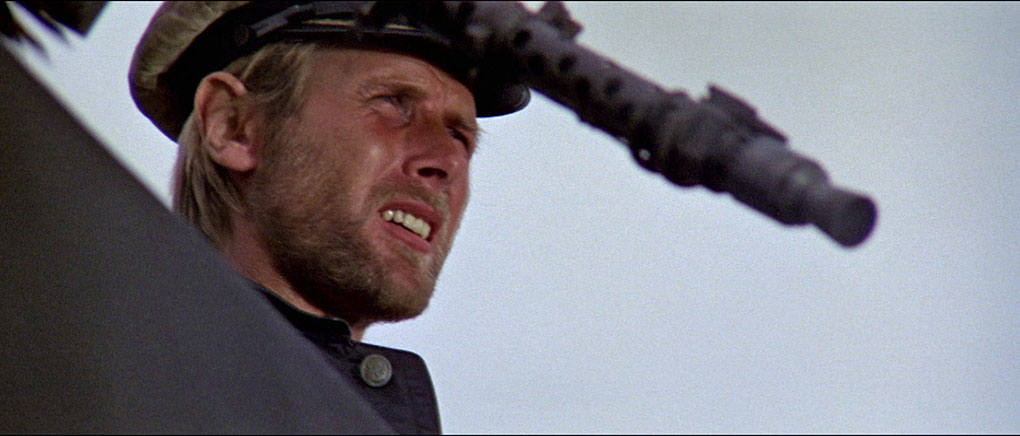
This is Horst Janson as Commander Lauchs, the U-Boat Captain, the man who ordered the slaughter of the helpless crew in the opening sequence. The fleshing out of the antagonists' characters is not high on the film's agenda but for cruelty and unwavering righteousness, look no further than Lauchs. The most human thing he does in the film is offer an injured man a cigarette without having the courtesy of telling him it would be his last. His striking looks are in some significant counterpoint to his dark character.
The trials of making such a complex production in such difficult circumstances may have soured the film to its own producer whose relationship with director Peter Yates broke down soon after the shoot. Michael Deeley is openly scathing about the project saying in his book "From the vantage point of today (2008 – Ed.), the film looks dated: nothing more than a string of clichéd scenes centring on a clichéd character." Don't sugar-coat it, Michael. Despite its orphan status, Murphy's War is due a new appraisal and despite 70s cutting rhythms requiring a little patience, the film is entertaining, extremely well made and as a study of obsession, it's a fine example of its kind.
Sourced from an HD restoration by Studiocanal, the 2.35:1, 1080p transfer on Indicator's Blu-ray is in impressive shape, with well-balanced contrast, solid black levels and no highlight burn-outs. Detail is crisply rendered and only softens just a whisper in a couple of wider shots. The colour leans heavily towards the naturalistic, but when brighter tones do appear – the deep blue of the seaplane in which Murphy hunts his prey is a good example – they are richly rendered without feeling over-saturated. A fine film grain is visible, and the image is spectacularly clean, and while there is a very faint flickering evident on areas of single colour (primarily skies), it barely registers and is in no way distracting.
The Linear PCM 1.0 mono soundtrack inevitably lacks the vabrance of more modern action movie tracks, but still holds its own with the clarity of the sound effects music and dialogue. Inevitably for a pre-Dolby track, the dialogue does lack bass, as do the gunfire and explosions, but the throb of the barge crane motor and especially the U-Boat engine
have more punch than expected. The track is clean of damage and any obvious traces of wear.
Optional English subtitles for the deaf and hearing impaired are available, and all of German dialogue is subtitled in English by default.
Michael Deeley in Conversation (2008): archival audio interview with the Murphy's War producer, recorded onstage at BFI Southbank (41:52)
Michel Deeley is promoting his fascinating 2008 memoir, Blade Runners, Deer Hunters and Blowing the Bloody Doors Off being interviewed by Michael Field, his writing partner on the project. All the usual suspects come up (except of course Murphy's War). Most time is spent on The Italian Job and Blade Runner though we stone skip over The Wicker Man, The Man Who Fell To Earth, Don't Look Now and Convoy. Michael Cimino and The Deer Hunter is pored over and having read the book, it's clear that Cimino pushed his luck with Deeley and seemed to have succeeded in wooing his next victim until Heaven's Gate almost wiped out United Artists. A fascinating and somewhat eccentric figure, Cimino made only four other films, none of which performed well. Michael Deeley is a man who will answer a yes/no question without significant elaboration and answers more general questions with a brevity and a thoughtful precision that probably has a lot to do with his remarkable success as a producer. Considering 'film producer' is more often a synonym for 'high-functioning bullshit artist' (OK, in Hollywood), Deeley sounds like a straight, honest and decent man in an often dishonest and indecent business. But if you've not read his book, this is a must-listen to interview. And then go and buy the book.
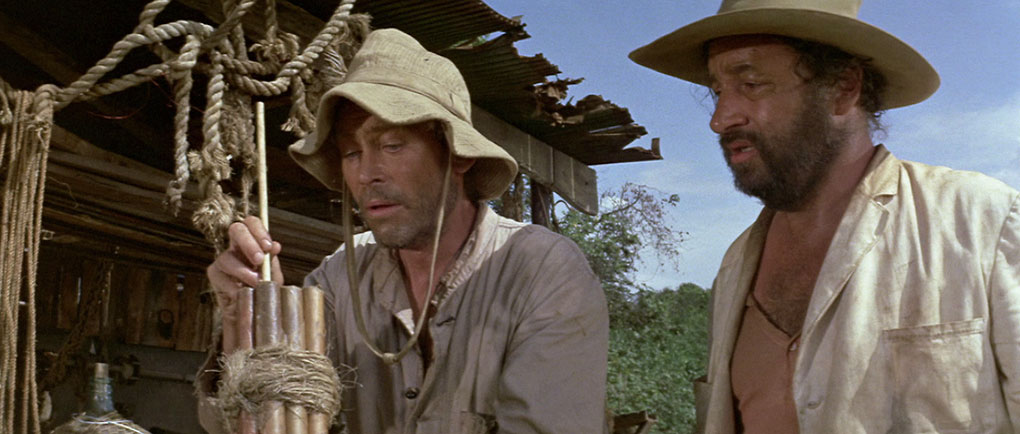
A Great Adventure: Interview with editor and assistant director John Glen (2022) (31:06)
At the time of the disc's release, Glen will be two weeks beyond his 90th birthday. He is still sharp as a tack with no memory problems. His stories are lively and entertaining and put a focus on often neglected areas of filmmaking. Sometimes, it's the view from the trenches that is more revealing about a film's production than those from the higher ups. It's nice he acknowledged the extraordinary work of the helicopter pilot and cameraman. It's also so pleasing to give voices to these extraordinary filmmakers that shaped childhoods and culture alike.
Dougie, Chic and Me: Interview with focus puller Robin Vidgeon (2022) (17:27)
Celebrated here, over and over, is a truism I've often expounded about the film industry. A good film crew can accomplish almost anything. More lovely stories from Douglas Slocombe's right hand man and again a production seen from a refreshingly different angle. Vidgeon's contribution is compelling to anyone interested in what it takes to make a film. He emphasizes that all the directors he worked with were decent human beings and the story of his hiring as a clapper/loader is priceless. Turning up to be treated for a head sustained gunshot wound fired from a submarine got the expected shock from the doctors. I didn't know that blank firing machine guns still actually ejected stuff from the barrel. There were clearly no directives on health and safety in the 70s.
Philippe Noiret on Murphy's War (5:57)
Noiret proves just as charming an interview subject as he does as Louis in the main feature. Smoking a cigar, he muses on the fact that cinema is cinema no matter what language you're working in. He was excited to find Peter Yates take on this film which would, in Noiret's eyes, be an amalgam of Bullitt and John and Mary, a film that had action but was very insightful on character. Noiret found O'Toole to be a delight to work with. Just checking on Yates' credits, I stumbled on his best work from my point of view, the sublime Breaking Away – oh, how a Blu-ray of that mini-masterpiece would be so welcome. Just planting that seed…
http://www.cineoutsider.com/reviews/dvd/b/breaking_away.html
One Man Army: Video appreciation by academic and film historian Sheldon Hall (2022) (17:17)
Dr. Hall fills us in with the prevailing context of the making of the film, how pennies were pinched and purses were tightened after the Easy Rider rewrite of Hollywood rules and expectations. It was then we said Goodbye Dolly and Dolittle and Hullo Dennis and Peter. He mentions that screenwriter Stirling Silliphant and director Yates had grandiose ideas of the film being an ironic anti-war statement when producer Michael Deeley wanted a simple escapist action film. It's interesting that the struggle between those two goals, the film turns into neither fish nor fowl. Hall mentions the difference between the novel and the film and that the protagonist's fate at the close undercut its commercial chances. In London it did well but in the rest of the UK and the US, it never caught fire. In fact the World War II action genre was rendered moribund in the mid 70s. He examines John Barry's sparse score and seeing the lead character from his friend Louis's point of view. Mr. Hall is clearly very well read up on the his subject.
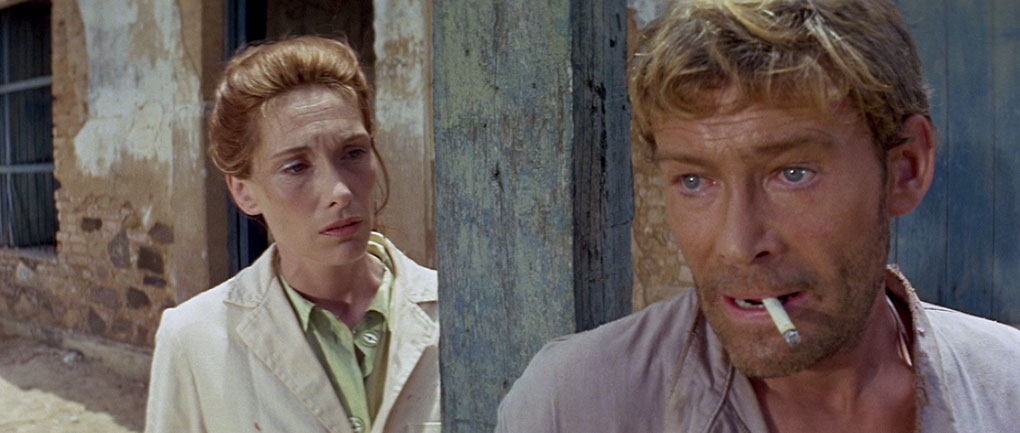
Behind the Camera: Douglas Slocombe (1999): archival documentary on the great cinematographer, featuring interviews with Richard Attenborough, Alan Parker and Ken Russell (12:46)
This was a lovely tribute to ace cinematographer Douglas Slocombe made in 1999 who started his career shooting the build up of Nazi Germany including a rally, those Leni Riefenstahl was famous for covering and at one point Slocombe interrupted Goebbels's speech with the clatter of his mute film camera. There's an irony in the fact that Hitler arrived just in time to distract the fawning crowd while he made his escape. It's lovely to see the motley group of film directors heaping praise on the unassuming man and his memories are well worth listening to. He's one of the few that knew his craft so well that he never used a light metre, a device that read how much light there is falling on the subject so you can calculate the correct exposure based on the sensitivity of your particular film stock. For this alone, I'm not surprised that Steven Spielberg was so impressed with Douglas Slocombe.
Super 8 version: original cut-down home-cinema presentation (20:15)
Iver Film Services logo of a costumed Super 8 man is on screen for 22 seconds. Is this a record? Full of film damage, this is a truncated version of the film with some nasty edits and some casual disregard for reframing the widescreen frame for a square Super 8mm size. A case in point: the dropping of the torpedo – the climax of the entire story – is absent as we focus on Murphy running for cover to the left of frame. Can't imagine anyone wanting to screen this for entertainment's sake though a dark, devilish voice inside me says that because the whole sea plane attack has been cut out, there's no interminable wait for the damn thing to fly…
Original theatrical trailer (3:18)
This textless example of its kind includes a few caught on the fly shots of a flock of birds and a zoom in to red macaws and a wobbly aerial that don't exactly fill you with confidence about the quality of the movie. The crash cut to the sea plane is effective and the voice over artist suitably gravelly. All the best parts of the first attack are given away and there's a playful touch of having two clearly enunciated 'bastard's drowned out by plane engine noise. You even get the torpedo being fired and an artful freeze frame of O'Toole as explosions blast around him. Some inevitable film damage is present and I was curious about what the trailer might look like with the text but failed to find it on YouTube.
Image gallery: promotional and publicity material
A generous 116 screens of colour and monochrome publicity stills, behind-the-scenes photos, artificially coloured lobby cards, magazine ads, scans of pages from the press book, and some really interesting posters.
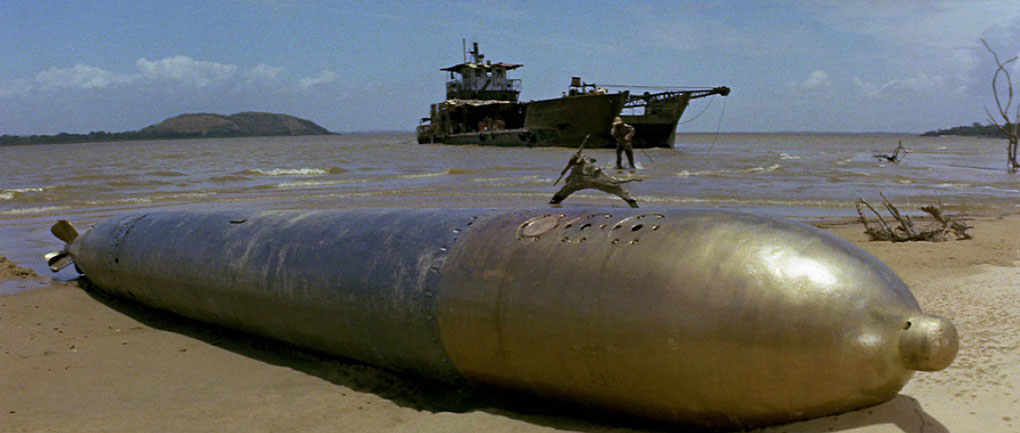
Limited edition exclusive booklet with a new essay by Julian Wheeler, an archival interview with Peter O'Toole, a look at the production of the film, an overview of contemporary critical responses, and film credits
The first essay by Julian Wheeler, No More Heroes, echoes and enlarges on many points the film prompted me to consider. But what he does underline with an idea that never occurred to me, is that Murphy's cinematic ancestry was in plain sight, namely the anti-heroes of the spaghetti westerns. His analysis of the film is illuminating and insights into why it faltered, valid and well-considered. We plainly disagree on the three minutes it took for the damn sea plane to take off but in all other areas, we seem to share a sly appreciation of a film that seems to have been unjustly neglected. I saw in Note 4 that producer Deeley said in an O'Toole biography that he immensely enjoyed the process of making this film. In the mischievous spirit of the next article of the booklet where contradictions abound, I was led to believe by Deeley's book that 'immensely enjoyed' was a little disingenuous. Another quote from Deeley's book: "But at the time my chief emotion was 'Finally, it's over…' Indeed, for a while I felt that I would never personally want to produce another movie ever again." He titles the Murphy's War chapter as 'The Greatest Film I Never Made and the Hellish One I Did'… He was offered The Godfather but director partner Yates was focussed on Murphy.
The Making of Murphy's War is the press kit peppered with extracts from Michael Deeley's book which flatly contradict some of the press kit's information. Renowned screenwriter Stirling Silliphant wasn't happy with the wildly unsympathetic performance of O'Toole even going so far to say he couldn't understand any of his dialogue and he wrote it.
Peter O'Toole on Location is Ken Burns' Photoplay Film Monthly interview with the star. You get a good sense of O'Toole's pragmatism, sense of adventure and love for French cigarettes. Knowing how his marriage turned out (Phillips' has written about his alcohol abuse and subsequent cruelty) it's somewhat ironic looking back at them in the salad days of their union.
Critical Response features Tom Milne in the Monthly Film Bulletin calling the film 'flat and colourless' which doesn't square with me at all. He does make a valid point in the absurdity of the U Boat Commander killing a man he thinks is the last witness of the submarine's presence and then ignores the doctor who has a functioning pair of eyes. Gordon Gow of Films and Filming mentions the 70s haircuts all the German submariners have as being like hippies! Roger Greenspun's piece for the New York Times singles out the editing for a bit of a whack… "the tedious cross-cutting between things (the sea plane to the motor barge)." Might he be referencing the 3 minute take off? He also praises the cast but indicates that the characters didn't interact enough.
There were so many aspects of the production of Murphy's War that were placed in the debit column of the film's ledger. But despite this and the contradictory ambitions of both producer and director, the film acquits itself very well given the distance of time. As I said, it's time for a reappraisal so for its quality alone, this release comes recommended.
|